In the past several months, the Orthodox faithful of Ukraine, including the clergy, have been increasingly asking how to regard the rites and Sacraments of the Ukrainian schismatics, whether they should still baptize those who were “baptized” in the Kiev Patriarchate (KP) as before, and whether the grace of God is active in the Sacraments of the Patriarchate of Constantinople now (after the joint service of Patriarch Bartholomew and the leader of the “OCU” Epiphany), in particular in Athonite monasteries. We discussed these issues with Archbishop Theodosy (Snigirev) of Boyarka, the vicar of His Beatitude Metropolitan Onuphry of Kiev and All Ukraine, the Chairman of the ecclesiastical court of the Kiev Diocese, and a teacher of Pastoral Theology in the Kiev Theological Academy and Seminary.
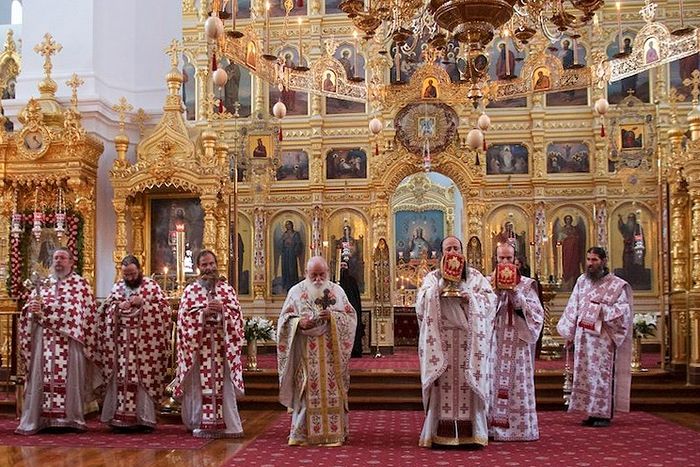 Divine Liturgy in the Skete of Prophet Elias on Mt. Athos. Photo: ikivotos.gr
Divine Liturgy in the Skete of Prophet Elias on Mt. Athos. Photo: ikivotos.gr
—Vladyka, after the break in Eucharistic communion with the Patriarchate of Constantinople, some theologians have said that the grace of God has ceased acting in the Sacraments of the Patriarchate of Constantinople. What do you think about this?
—I don’t think that’s true. The break in Eucharistic communion in this case is not a mystical measure, but one of discipline. Therefore, of course grace continues to operate in the Sacraments of the Church of Constantinople. It would be strange to think that at the Liturgy celebrated today, for example, at St. Panteleimon’s Monastery on Mt. Athos, the bread and wine were not transformed into the Body and Blood of Christ.
—But some in the Orthodox world take the decision of the Russian Church that way. For example, the recent letter of His Beatitude Archbishop Anastasios of Albania to His Holiness Patriarch Kirill says: “The decisions of the hierarchs of the Russian Church cannot remove the validity of the action of the Holy Spirit in the Orthodox churches of the jurisdiction of the Ecumenical Patriarchate.”
—No one has claimed that. I think it’s obvious. It’s strange that such a thought has arisen at all. The break in Eucharistic communion was an action of a diplomatic-disciplinary character in Church relations. It was a last resort. It’s like when a priest is suspended from serving for some moral crimes—it’s also a disciplinary measure. That is, grace is not removed from the pastor, although he is forbidden to serve and celebrate the Sacraments. If the forbidden priest still serves the Liturgy, it leads to his defrocking. Although the given Liturgy was still truly celebrated since he wasn’t yet defrocked. But if this cleric is defrocked, he becomes an ordinary layman. After that, even if he continues to unlawfully dress in sacred vestments, grace no longer acts through him: He has ceased to be a priest.
—I want to clarify about suspended priests. There is the opinion that a priest who has been suspended cannot truly celebrate the Sacraments.
—That’s a misconception. A priest deprived of his rank cannot truly celebrate the Sacraments, but the situation is different when a priest is under suspension from serving. He’s forbidden from celebrating the Sacraments, but the grace of the priesthood has not been taken from him. In some cases he’s even allowed to wear the priestly cross and bless people. If the priest is banned for life, but meanwhile he lives piously, then in rare situations, for example, once a year, on his name’s day, they could allow him to serve Liturgy. He doesn’t stop being a priest while under suspension. Also, “for fear of death,” a suspended priest can hear confessions and commune the dying. Although, after that he must necessarily confess what happened to his bishop and receive either some permission from him or a worsening of his canonical punishment, depending on the justification for his actions, because according to the canons of the Church, he should be fully defrocked for an unauthorized violation of his suspension. This is the usual logic of recognition or non-recognition of the grace of the priesthood and hence the efficacy of the Sacraments, laid down by the Holy Fathers in the code of canon law of the Orthodox Church. It is precisely according to this logic, according to the canonical rules and historical practice of the Church, that if a bishop, unlawfully or being under suspension, ordains someone, then this bishop himself, and the one ordained by him—not just the former—should be defrocked. That is, the latter, the one ordained, is also considered a cleric, and the Sacrament of ordination under ban is recognized as having been celebrated, although unlawfully so. At the same time, clergy who were ordained in schism by suspended hierarchs can be received into the bosom of the Church in their existing rank, without reordination, as true clergy, if they show repentance. There are many such examples in the life of the Church, right up to our day. It’s a completely different matter if bishops who ordained people were deprived of their rank at that point, as with the “Kiev Patriarchate.” There is no way to recognize such ordinations because being defrocked is not just a disciplinary but a sacramental measure.
—Understood. But let’s return to the break in communion with the Patriarchate of Constantinople. They say the Russian Church has forbidden Constantinople to celebrate the Sacraments, but it continues to do so.
—Of course not. In our case, the disciplinary measure is not in banning Constantinople from celebrating anything. And anyways, we have no power over them. This analogy applies only to the action of grace. That is, grace, despite our broken Eucharistic communion with them, acts in their churches. Although, at the same time, there exists a serious ecclesiastical problem. The disciplinary measure in this case is a warning to all the faithful of the Russian Church and the entire Orthodox world that the Phanar has violated the canons of Orthodoxy, that it has openly declared the heresy of Eastern papism, and that this spiritual infection must be localized and cured. And the break in Eucharistic communion is an elementary spiritual protection for our hierarchs and clergy from joint service with people from the OCU, who have no clerical rank. After all, such concelebration is now normal in the Patriarchate of Constantinople. Therefore, it’s better for Constantinople to be under quarantine for now.
—So, for a simple believer there’s no difference? Grace works equally where there is Truth and where there is “spiritual infection,” as you say, that is, the violation of canons and heresy?
—For now, I think yes, grace is still active. But to approach the Sacraments in the Patriarchate of Constantinople against the decision of our Church is like going to the service of a suspended priest who violates this suspension. Is this proper? It’s completely improper and spiritually dangerous both for yourself and for such a priest. Quite recently our pilgrims asked one well-known Athonite spiritual father whether they could commune in this period on Athos, as it’s the canonical territory of the Patriarchate of Constantinople. He answered that such Communion doesn’t do you any good, because you’re breaking the blessing, breaking the obedience of our holy Church.
In general, if we’re talking about the gracious efficacy of the Sacraments, then, in my opinion, the degradation of ecclesiality in this or that Church community has to travel along a certain path to reach a state of graceless Sacraments. That is, if we’re talking about communities with Apostolic succession.
—What does that mean?
—In Church communities infected with heresy and further, having departed from the true Church of Christ and its teachings, though they have outwardly preserved the look of Church structures, grace has dried up in their Sacraments. St. Seraphim (Sobolev), for example, said that beyond the boundaries of the Orthodox Church, among the schismatics and heresies, nevertheless having Apostolic succession, the grace given in Baptism and Chrismation, although present, is like a Divine spark—it is deeply hidden under the ashes of false teachings and therefore cannot act. Continuing the thought of the Holy Fathers, it is fair to assume that according to the measure of withdrawal of such communities from Orthodoxy, from true Church Tradition, the grace of the Holy Spirit in their Sacraments dries up all the more. It is not yet completely depleted. Where pride and heresy reign, including the heresy of papism, there is no grace, it’s buried under concrete and can no longer act. May this never happen with our Phanariot brothers! It’s not too late to fix everything.
But I repeat: Such ecclesiological logic is appropriate only if we’re talking about a community with Apostolic succession, and not about structures like the “Kiev Patriarchate—OCU,” for example. From the beginning, there was no power of the Sacraments there, because there is no Apostolic succession.
—Say a few words about Apostolic succession in the “UOC KP-OCU.” As far as I recall, their hierarchy is based on former priests deprived of their rank?
—All of the “ordinations” of this structure came from two defrocked former bishops—Philaret Denisenko and Jacob Panchuk, that is, from simple monks wearing hierarchical robes. In June 1992, for causing a schism, they were defrocked by the authorized body—the Bishops’ Council, whose decision subsequently found reception in all the Orthodox Churches of the world. After their defrocking, these schismatics created their own new structure and, being ordinary monks, began to make new “bishops,” of course, without the grace of Apostolic succession. Thus was created a parallel UOC quasi-church in Ukraine—the “Kiev Patriarchate.”
You can legalize these defrocked “bishops” with whatever tomos and state laws you want, but grace is not added thereby. It’s like in math: Whatever number you multiply by zero, the result will still be zero. Therefore, the Local Churches are now refusing, one after another, to recognize these citizens as clergy headed by Epiphany. None of the world hierarchs who have a clear conscience will concelebrate before the throne of God with secular people, even if they ideologically sympathize with them. Moreover, it’s simply spiritually dangerous to enter into Eucharistic communion with the “OCU” because according to canon law, those having communion with the excommunicated are subject to excommunication.
—How did Patriarch Bartholomew concelebrate with someone having no clerical rank? Was the holy Eucharist truly celebrated at such a Liturgy?
—He just concelebrated. I don’t know how he felt at this service… To illustrate this absurdity, I tell the students at the Academy and Seminary to imagine the following. If at the next Sunday Liturgy, I lend someone my vestments and put him next to me, and we “serve” together—is the Liturgy accomplished? It is accomplished, of course, because the hierarch served it. Does the student become a bishop because of this service? Of course not. What will he and I have to say for this “service” then at the Dread Judgment? It will be difficult to answer. This is what happened in Istanbul on January 6.
—Vladyka, you said that clergy who are under suspension are not deprived of the grace of the Sacraments. At the same time, the hierarchy of the UOC KP was founded by defrocked bishops. But there is an opinion that the grace of the priesthood (episcopate) is indelible, like the grace of Baptism. If that’s so, then in 1992, Philaret and Job remained legitimate, although suspended bishops—so does that mean that the hierarchy coming from them is also legitimate and has Apostolic succession?
—If the grace of the priesthood were indelible, then this logic would be just. But it’s not. Unlike the grace of Baptism, holy orders can be lost. Once and for all. The whole body of canon law of the Orthodox Church speaks about this. He who is once deprived of his holy orders can never have them restored or receive them again. The Catholic church has a different teaching on this matter, different from Orthodoxy. Sometimes some people try to pass this Catholic error off as Orthodox, for their own interests. But it’s not true; it’s a deception.
Some say there are historical precedents, exceptions to the rule, when the Church restored its clergy after a defrocking, even posthumously. But such seeming exceptions, in fact, are neither exceptions nor violations of the canonical rules. In such cases, the Church determines that the earlier decisions to remove the holy order were the result of an error, regardless of the circumstances, whether groundlessness, or some other illegitimate reasons. That means it had and has no legal force and the clergyman was and remains a clergyman. It’s a kind of spiritual “rehabilitation,” the recognition of a priest as a victim—undeservedly and in fact never really deprived of his rank. In such a situation, the rank is not returned, but its presence is declared, and the error of the proceedings is recognized. Of course, this happens in the rarest of cases, on absolutely clear and indisputable grounds. Such a decision is exclusively within the competence of the Church that defrocked the clergyman.
In our case, Philaret and Jacob were fully justifiably, lawfully, and definitively deprived of their holy orders by their Mother-Church, and there are absolutely no grounds for the Church to recognize this defrocking as invalid. Moreover, they didn’t reconcile themselves to this and organized a colossal Church schism. It was after their lawful defrocking that they began to create their “hierarchy” of the UOC KP. This “hierarchy” has no Apostolic succession, and thus, no grace. This is clear to the entire Orthodox world, and thus no one wants to concelebrate with them.
—And how was it with the return of the Russian Church Abroad to the Moscow Patriarchate? Was it not an analogous situation, with everyone being received in their clerical rank? “OCU” representatives love to bring this example now as an argument.
—The situation was completely different, and our schismatics know that perfectly well. They’re just misleading people as usual. Throughout the entire stormy twentieth century, none of the ROCOR hierarchs were defrocked for schisming, and what’s more, were not excommunicated from the Church. On the part of the Moscow Patriarchate, only disciplinary measures were taken—bans on serving, which, as we have already said, does not deprive the priest of the grace of his order or of Apostolic succession. Even during the time of this split, ROCOR hierarchs were sometimes received in some Local Churches and concelebrated with the local clergy. No one ever doubted the legitimacy and grace of their ordinations. Therefore, when the time of the unification came, they were all recognized in their existing rank. It’s a completely different situation from the “UOC KP-OCU.”
—Understood. But what about the fact that the OCU has two legitimately ordained “hierarchs?”
—Indeed, the transition of Metropolitans Simeon and Alexander to this structure has complicated the canonical understanding of what is happening. Everything was simple before: This is black, and this is white; here the Sacraments have grace, and here they don’t. The situation inside this schism now could be called “hybrid.”
—Explain in more detail, please.
—After the departure into the schism of the “UOC KP-OCU” of two real bishops and a few dozen priests from the Ukrainian Orthodox Church, these clerics of ours were automatically subjected to a ban from serving by the Holy Synod of the UOC or from their diocesan hierarchs. At the same time, as we have said above, a ban from serving does not deprive the clergy of the grace of the priesthood, but only forbids them from celebrating anything. If with time, the defrocking of those who have departed into schism should follow, then everything will fall into its logical place. But for now, according to Orthodox ecclesiology, the Sacraments are celebrated by their hands, including the Sacrament of the ordination of deacons and priests that these metropolitans practice under ban. Thus we have a hybrid situation: Among this graceless field, the Sacraments are celebrated by clergy with Apostolic succession. Although they are celebrated under ban, they are not deprived of their lawful action.
—In this situation, how can we understand whether a child baptized in the OCU is baptized? And the same with weddings, funerals for the departed, and so on?
—First of all, I want to say that to some these discussions about the actions of grace may seem like lifeless scholasticism. After all, everyone has heard that the Spirit bloweth where it listeth (Jn. 3:8). But in fact, these questions are vital and important for every individual believer. The Lord Himself, arranging His New Testament vineyard, established a fence in it and determined the rules of life of the Church. Through the councils of the apostles and holy hierarchs, the logic of the Church’s structure on earth and the prescribed laws and rules of its life were revealed to people. We live in this paradigm in the Orthodox Church to this day, learning its truthfulness in spiritual experience, ascertaining that its Creator is God. Therefore, when “Orthodox Protestants” start telling us we have no right to determine where and how the grace of God acts, that there is no such “device” for measuring grace, then we perfectly understand for ourselves that it’s not us, but the Lord Himself Who determines the logic of the action of His grace among people for their salvation. He has defined and revealed this logic in the Church, establishing a lawful hierarchy, canons, and Church rules. I mustn’t consider myself smarter and more merciful than God. And there are “devices” for measuring grace—human souls. That is why the usual services in the city churches of the OCU are empty, unlike our churches and monasteries. They’re just as empty as with the Renovationists in the twentieth century. Therefore they have no monks or real monasteries. So this is not scholasticism, but real spiritual life.
As for the “Sacraments” of the OCU, in every particular situation, the priest or bishop of our Church has to figure it out, to the extent necessary: Who baptized the child, who married the couple? Who ordained this cleric? Was the metropolitan or priest or representative of the “old guard” of the UOC KP suspended from serving? And depending on this he can determine whether it’s possible to consider the Sacraments celebrated lawfully or not. That’s how it will be until either the suspended clergy are finally defrocked or this issue is resolved otherwise, by pan-Orthodox consensus.
—But the former metropolitans claim that the Ukrainian Orthodox Church is not the canonical authority over them now and it’s impossible to defrock them, since on the eve of the false council they transferred to the jurisdiction of the Patriarchate of Constantinople. They can produce the relevant letters from Patriarch Bartholomew.
—It’s all false canonical tightrope walking. No clergy, much less a bishop, can transfer to any other jurisdiction without being released and blessed for it by his Church that ordained him. This is an axiom of canon law, adopted and approved at the Ecumenical Councils. It cannot be abolished or overstepped by Patriarch Bartholomew or the Verkhovna Rada by its laws, or anyone else. Legally, as citizens, they are free to transfer anywhere they want, to the “Kiev Patriarchate,” to Patriarch Bartholomew, to the Uniates, or to the Baptists. But canonically, as Orthodox hierarchs, they are subject only to their original Church. Thus, regardless of any letters, Metropolitans Simeon and Alexander remain banned from serving as clergy of the Ukrainian Orthodox Church, where they received their holy orders and which has the exclusive right to decide their future canonical fate.
—That brings up the question: Then why are these former metropolitans and clergy who have gone into schism not defrocked? And is it possible to pray for them now, or remove a particle for them at proskomidia? Should they be referred to with their old rank?
—I’ll start with the last question: For now we have to call metropolitans and priests who have gone into schism as before: metropolitans, archpriests, priests—in accordance with their rank, adding “forbidden to serve.” After all, they have not been defrocked, although they have been deprived of their old titles with the names of cities, which now, of course, are not commemorated. To pray for them is not only possible, but necessary. They are our brothers, although lost—especially if you knew these clergy personally, if you had a relationship with them. The Holy Synod of the Ukrainian Orthodox Church directly called upon us in December to pray for the metropolitans and priests who have gone into schism.
Regarding their commemoration at the proskomidia, there are different opinions. Some believe it’s possible to commemorate such clergy at the proskomidia until they, God forbid, are excommunicated from the Church. Conversely, others believe it’s already categorically forbidden to commemorate them in the proskomidia. I think in this matter, we can be guided by the opinion of St. Simeon of Thessaloniki:
“If someone who has given himself over to sin does not want to retreat from it, such a one being unworthy of communion with God will receive greater condemnation for himself through the sacrifice made for him… As beneficial as it is for him for whom the sacrifice is offered when he lives worthy of the title of Christian, so disastrous and harmful it is to him who, having given himself over to a sinful life, cares not for the worthy conduct of his Christian calling.”
As for the defrocking of these clergy—that question, I think, will be resolved by the Church when the hierarchs see some pastoral usefulness in it. That is, when the harm done to the flock by their behavior exceeds the probability of their near repentance and return to ministry in their existing rank.

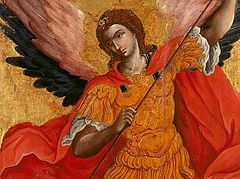
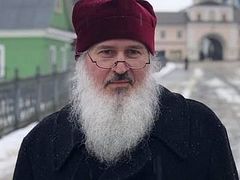
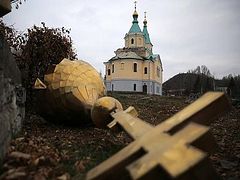
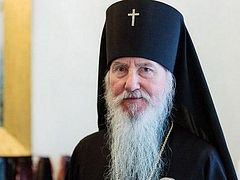
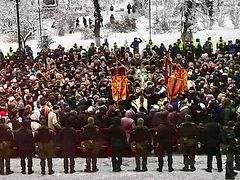
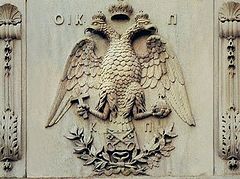
This does not contradict the use of the economy of St. Mark of Ephesus partecipating at Florence Council, (in order to and) before drawing his orthodox conclusions, as Archbishop Theodosy does.
Stop thinking that the Holy Spirit is subject to a kind of switch in the hand of men.
It's ludicrous, and extremely dangerous for your spiritual well-being.
http://tass.com/society/1027025
That statement is pretty clear to me. Unless Metropolitan Hilarion no longer speaks for the MP, or that some how the "translation" was incorrect, or that we are now getting into the realm of verbal contortions: "He didn't ACTUALLY say Schismatic, what he meant was blah blah blah...."
The MP came out initially guns blazing, with the fire and brimstone rhetoric, but when the MP received pushback from within their Church from people with deep ties to the Holy Mountain (and to St. Anthony's in Arizona among other places). They have "clarified" their position. It is incoherent. How can the MP "cherry pick" which parts of he EP are "okay?"
I have just a minor question: were the clergies who left CP for ROCOR in US and Italy released and blessed by their hierarchs to do so?
Were the Uniates of the late 19th or Early 20th Century re-ordained before being received by the MP? (including St. Alexis Toth)
How is this coherent? I understand it though. Many Russians have bristled at these harsh characterizations (due to their ties to Mt. Athos and elsewhere), so the MP has had to quietly walk back their "schismatic" rhetoric against the EP, as it is seen as a step too far, even for those Churches who support the MP, such as Serbia and Antioch.